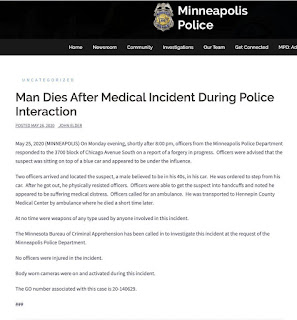Almost a year after George Floyd's death sparked worldwide protests, the man who kneeled on his neck was ultimately convicted of murder and is facing decades in prison. This traumatic cultural moment has raised an important question for young journalists - how do you report on police activity?
The question has been raised in light of the initial press release from Minneapolis Police shortly after George Floyd's death. In a statement, the police said Floyd "appeared to be suffering medical distress" and was subsequently transported via ambulance to a hospital where he died "a short time later". At no point in the release was it made clear that Derek Chauvin had placed his knee on Floyd's neck for nearly 10 minutes while he gasped for air and told the officers that he could not breathe. This vague, misleading and wholly incorrect initial statement questions the whole premise of reporting solely on what police "said".
If not for the video, that release may have been the final word on George Floyd. But of course, a bystanders video did show the actual events of that day, and a year later Chauvin was convicted of murder. Going forward, it is important for journalists to remember that police officers presenting the "official narrative" should never be the standalone source for a story, especially if the story involves potential police misconduct.
An example where this is not done very well is this New York Times story about the police killing of Andrew Brown Jr. Here, the official narrative is heavily relied upon for the majority of the story, and it appears as though the Times did not make an effort to get any bystander accounts.
But based on this ABC News story, it appears there were indeed eyewitness accounts to dive into as they are cited in this story.
Bodycam video of Andrew Brown shooting will be redacted before shown to family (msn.com)
The nation's leading paper should take the lessons of George Floyd more seriously and improve its police reporting to reflect that the "official" narrative is only one particular narrative that may not be the truth.

Comments
Post a Comment